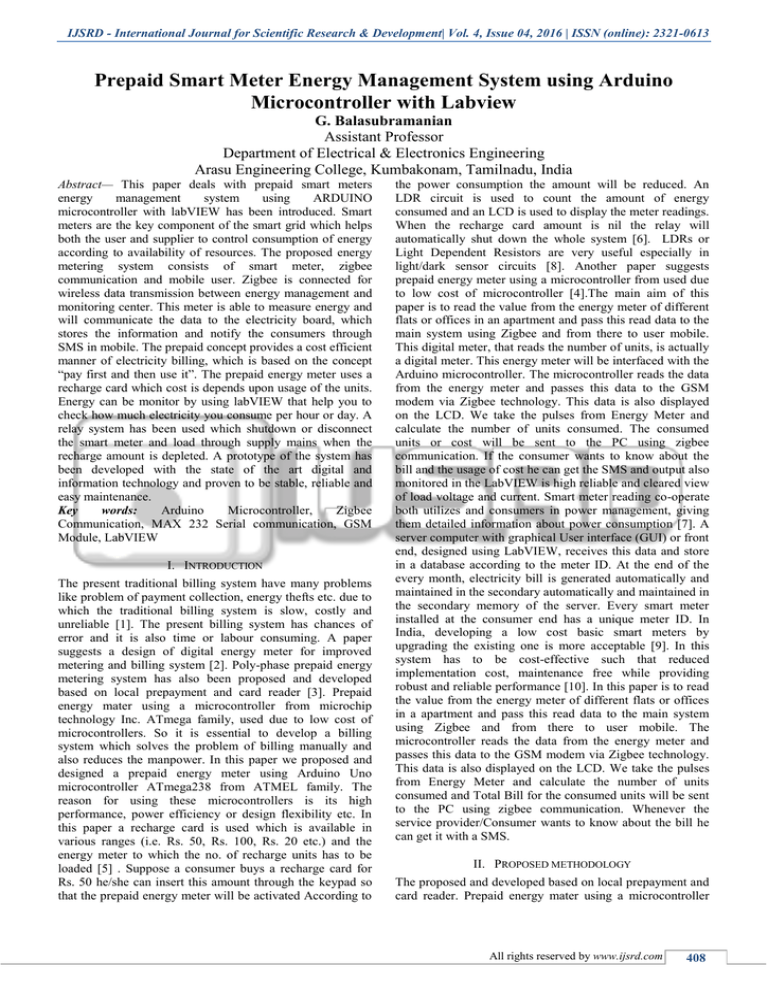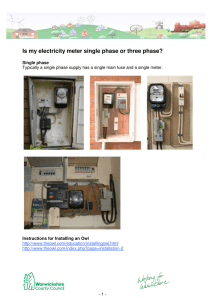
IJSRD - International Journal for Scientific Research & Development| Vol. 4, Issue 04, 2016 | ISSN (online): 2321-0613
Prepaid Smart Meter Energy Management System using Arduino
Microcontroller with Labview
G. Balasubramanian
Assistant Professor
Department of Electrical & Electronics Engineering
Arasu Engineering College, Kumbakonam, Tamilnadu, India
Abstract— This paper deals with prepaid smart meters
energy
management
system
using
ARDUINO
microcontroller with labVIEW has been introduced. Smart
meters are the key component of the smart grid which helps
both the user and supplier to control consumption of energy
according to availability of resources. The proposed energy
metering system consists of smart meter, zigbee
communication and mobile user. Zigbee is connected for
wireless data transmission between energy management and
monitoring center. This meter is able to measure energy and
will communicate the data to the electricity board, which
stores the information and notify the consumers through
SMS in mobile. The prepaid concept provides a cost efficient
manner of electricity billing, which is based on the concept
“pay first and then use it”. The prepaid energy meter uses a
recharge card which cost is depends upon usage of the units.
Energy can be monitor by using labVIEW that help you to
check how much electricity you consume per hour or day. A
relay system has been used which shutdown or disconnect
the smart meter and load through supply mains when the
recharge amount is depleted. A prototype of the system has
been developed with the state of the art digital and
information technology and proven to be stable, reliable and
easy maintenance.
Key
words:
Arduino
Microcontroller,
Zigbee
Communication, MAX 232 Serial communication, GSM
Module, LabVIEW
I. INTRODUCTION
The present traditional billing system have many problems
like problem of payment collection, energy thefts etc. due to
which the traditional billing system is slow, costly and
unreliable [1]. The present billing system has chances of
error and it is also time or labour consuming. A paper
suggests a design of digital energy meter for improved
metering and billing system [2]. Poly-phase prepaid energy
metering system has also been proposed and developed
based on local prepayment and card reader [3]. Prepaid
energy mater using a microcontroller from microchip
technology Inc. ATmega family, used due to low cost of
microcontrollers. So it is essential to develop a billing
system which solves the problem of billing manually and
also reduces the manpower. In this paper we proposed and
designed a prepaid energy meter using Arduino Uno
microcontroller ATmega238 from ATMEL family. The
reason for using these microcontrollers is its high
performance, power efficiency or design flexibility etc. In
this paper a recharge card is used which is available in
various ranges (i.e. Rs. 50, Rs. 100, Rs. 20 etc.) and the
energy meter to which the no. of recharge units has to be
loaded [5] . Suppose a consumer buys a recharge card for
Rs. 50 he/she can insert this amount through the keypad so
that the prepaid energy meter will be activated According to
the power consumption the amount will be reduced. An
LDR circuit is used to count the amount of energy
consumed and an LCD is used to display the meter readings.
When the recharge card amount is nil the relay will
automatically shut down the whole system [6]. LDRs or
Light Dependent Resistors are very useful especially in
light/dark sensor circuits [8]. Another paper suggests
prepaid energy meter using a microcontroller from used due
to low cost of microcontroller [4].The main aim of this
paper is to read the value from the energy meter of different
flats or offices in an apartment and pass this read data to the
main system using Zigbee and from there to user mobile.
This digital meter, that reads the number of units, is actually
a digital meter. This energy meter will be interfaced with the
Arduino microcontroller. The microcontroller reads the data
from the energy meter and passes this data to the GSM
modem via Zigbee technology. This data is also displayed
on the LCD. We take the pulses from Energy Meter and
calculate the number of units consumed. The consumed
units or cost will be sent to the PC using zigbee
communication. If the consumer wants to know about the
bill and the usage of cost he can get the SMS and output also
monitored in the LabVIEW is high reliable and cleared view
of load voltage and current. Smart meter reading co-operate
both utilizes and consumers in power management, giving
them detailed information about power consumption [7]. A
server computer with graphical User interface (GUI) or front
end, designed using LabVIEW, receives this data and store
in a database according to the meter ID. At the end of the
every month, electricity bill is generated automatically and
maintained in the secondary automatically and maintained in
the secondary memory of the server. Every smart meter
installed at the consumer end has a unique meter ID. In
India, developing a low cost basic smart meters by
upgrading the existing one is more acceptable [9]. In this
system has to be cost-effective such that reduced
implementation cost, maintenance free while providing
robust and reliable performance [10]. In this paper is to read
the value from the energy meter of different flats or offices
in a apartment and pass this read data to the main system
using Zigbee and from there to user mobile. The
microcontroller reads the data from the energy meter and
passes this data to the GSM modem via Zigbee technology.
This data is also displayed on the LCD. We take the pulses
from Energy Meter and calculate the number of units
consumed and Total Bill for the consumed units will be sent
to the PC using zigbee communication. Whenever the
service provider/Consumer wants to know about the bill he
can get it with a SMS.
II. PROPOSED METHODOLOGY
The proposed and developed based on local prepayment and
card reader. Prepaid energy mater using a microcontroller
All rights reserved by www.ijsrd.com
408
Prepaid Smart Meter Energy Management System using Arduino Microcontroller with Labview
(IJSRD/Vol. 4/Issue 04/2016/100)
from microchip technology Inc AT mega family, used due
to low cost of microcontrollers. So it is essential to develop
a billing system which solves the problem of billing
manually and also reduces the manpower. In this paper we
proposed and designed a prepaid energy meter using
Arduino Uno microcontroller ATmega328 from ATMEL
family. The reason for using these microcontrollers is its
high performance, power efficiency or design flexibility etc.
header, and a reset button. It contains everything needed to
support the microcontroller; simply connect it to a computer
with a USB cable or power it with a AC-to-DC adapter or
battery to get started.
III. BLOCK DIAGRAM
Fig. 4: Arduino Micro Controller
VI. ATMEGA328 MICROCONTROLLER
Fig. 1: Transmitter Section
Fig. 2: Receiver Section
IV. CIRCUIT DIAGRAM
The device is manufactured using Atmel’s high density nonvolatile memory technology. The On-chip ISP Flash allows
the program memory to be reprogrammed In-System
through an SPI serial interface, by a conventional nonvolatile memory programmer, or by an On-chip Boot
program running on the AVR core. The Boot program can
use any interface to download the application program in the
Application Flash memory. Software in the Boot Flash
section will continue to run while the Application Flash
section is updated, providing true Read-While-Write
operation. By combining an 8-bit RISC CPU with In-System
Self-Programmable Flash on a monolithic chip, the Atmel
ATmega328 is a powerful microcontroller that provides a
highly flexible and cost effective solution to many
embedded control applications. The ATmega328 AVR is
supported with a full suite of program and system
development tools including: C Compilers, Macro
Assemblers, and Program Debugger/Simulators, In-Circuit
Emulators, and Evaluation kits. The Arduino Uno is a
microcontroller board based on the ATmega328. It has
14 digital input/output pins (of which 6 can be used as
PWM outputs), 6 analog inputs, a 16 MHz crystal oscillator,
a USB connection, a power jack, an ICSP header, and a
reset
button. Arduino Microcontroller. An Atmel
ATmega328 microcontroller operating at 5 V with 2Kb of
RAM, 32 Kb of flash memory for storing programs and 1
Kb of EEPROM for storing parameters. The clock speed is
16 MHz, which translates to about executing about 300,000
lines of C source code per second. The board has 14 digital
I/O pins and 6 analog input pins. There is a USB connector
for talking to the host computer and a DC power jack for
connecting an external 6-20 V power source, for example a
9 V battery, when running a program while not connected to
the host computer.
Fig. 3: Circuit Diagram
V. ARDUINO MICROCONTROLLER
The Arduino is a microcontroller board based on the
ATmega328. It has 14 digital input/output pins (of which 6
can be used as PWM outputs), 6 analog inputs, a 16 MHz
crystal oscillator, a USB connection, a power jack, an ICSP
All rights reserved by www.ijsrd.com
409
Prepaid Smart Meter Energy Management System using Arduino Microcontroller with Labview
(IJSRD/Vol. 4/Issue 04/2016/100)
VII. PIN DIAGRAM
Fig. 5: Pin Diagram of ATmega328 Microcontroller
VIII. ZIGBEE COMMUNICATION
Zigbee is a new emerging technology used now days for
short range communication network which works on a
unique identification code. This unique ID makes this device
highly reliable in terms of security. It is a wireless
communication device which is comprised of a Tran’s
receiver just like a blue tooth device or a Wi-Fi network but
data rate is slow. It has 16 bits address so it creates 65536
nodes in a network or in other words it has 16 Channels for
communication. It is a monitoring and controlling device in
communication networks. The only difference in Zigbee is it
uses unique identity method means if one Zigbee device
transmits data then it is received by only that Zigbee device
which is having its decoding address. While in Bluetooth or
Wi-Fi anybody can transmit or receive data. So data is
prevented in Zigbee device, nobody can manipulate the data.
Only authorized person or device can read data. Main
features of Zigbee are low data rate and low power
consumption.
Table 1: Specification of Communication
directly or to any microcontroller. It can be used to send and
receive SMS or make/receive voice calls. This GSM modem
is a highly flexible plug and play quad band GSM modem
for direct and easy integration to RS232 applications.
Supports features like Voice, SMS, Data/Fax, GPRS and
integrated TCP/IP stack. This GSM Modem can accept any
network operator SIM card and act just like a mobile phone.
Fig. 6: Block Diagram of GSM Modem Communication
X. LABVIEW
LabVIEW, short for Laboratory Virtual Instrument
Engineering Workbench, is a programming environment in
which you create programs using a graphical notation
(connecting functional nodes via wires through which data
flows); in this regard, it differs from traditional
programming languages like C, C++, or Java, in which you
program with text. LabVIEW is much more than a
programming language. It is an interactive program
development and execution system designed for people, like
scientists and engineers, who need to program as part of
their jobs. The LabVIEW development environment works
on computers running Windows, Mac OS X, or Linux.
LabVIEW can create programs that run on those platforms,
as well as Microsoft Pocket PC, Microsoft Windows CE,
Palm OS, and a variety of embedded platforms, including
Field Programmable Gate Arrays (FPGAs), Digital Signal
Processors (DSPs), and microprocessors. Using the very
powerful graphical programming language that many
LabVIEW users affectionately call "G" (for graphical),
LabVIEW can increase your productivity by orders of
magnitude. Programs that take weeks or months to write
using conventional programming languages can be
completed in hours using LabVIEW because it is
specifically designed to take measurements, analyze data,
and present results to the user.
IX. GSM MODEM COMMUNICATION
GSM modem can accept any GSM network operator SIM
card and act just like a mobile phone with its own unique
phone number. Advantage of using this modem will be that
you can use its RS232 port to communicate and develop
embedded applications. Applications like SMS Control, data
transfer, remote control and logging can be developed
easily. The modem can either be connected to PC serial port
Fig. 7: Blocks Diagram of Program at Server Side
All rights reserved by www.ijsrd.com
410
Prepaid Smart Meter Energy Management System using Arduino Microcontroller with Labview
(IJSRD/Vol. 4/Issue 04/2016/100)
Fig. 8: Front View of Program at Server Side
Fig. 11: LabVIEW (GUI)
XI. CONCLUSION
Fig. 9: Photograph of Hardware
This paper present wireless communication based prepaid
energy meter can control the usage of electricity on
consumer side to avoid wastage of power. Prepaid energy
meter is a concept to minimize the electricity theft with a
cost efficient manner. The users are not bound to pay
excesses amount of money, users have to pay according to
their requirement. It can reduce problems associated with
billing consumers living in isolated areas and reduce
deployment of manpower for taking meter readings. Prepaid
energy meter is more reliable and user friendly. From all
these we can conclude that if we implement this prepaid
energy meter then it can become more beneficial. We get the
alert message before reach the low balance and also
consumer get the periodic message about the unit and cost
after the completion of a day. This is efficient and also low
power consumption. In this proposed system output is
clearly monitored by LabVIEW.
REFERENCES
Fig. 10: Hardware
[1] Devidas, A.R., Ramesh, M.V. “Wireless Smart Grid
Design for Monitoring and Optimizing Electric
Transmission in India,” 2010 Fourth International
Conference on Sensor Technologies and Applications
(SENSORCOMM),” pp.637-640, 2010.
[2] Md. Mejbaul Haque “Microcontroller Based Single
Phase Digital Prepaid Energy Meter for Improved
Metering” International Journal of Power Electronics
and Drive System (IJPEDS) December 2011, pp.
139~147.
[3] Ling Zou, Sihong Chu and Biao Guo.,“The Design of
Prepayment Polyphase Smart Electricity Meter
System,” International Conference on Intelligent
Computing and Integrated Systems (ICISS), pp. 430432, 22-24, Dec 2010.
[4] Loss, P et al., “A Single Phase Microcontroller Based
Energy
Meter,”
IEEE
Instrumentation
and
All rights reserved by www.ijsrd.com
411
Prepaid Smart Meter Energy Management System using Arduino Microcontroller with Labview
(IJSRD/Vol. 4/Issue 04/2016/100)
Measurement Technology Conference. St. Paul
Minnesota, USA, May 18-21, 1998.
[5] www.8051projects.net/download-d134-prepaidenergymeter-at89s52.
[6] Prepaid Energy Meter (AT89S52) 8051 Microcontroller
Indian engineer. wordpress.com/.../prepaid-energymeter at89s52.
[7] L. Li , X. Hu, W. Zhang, Design of an ARM-Based
Power Meter having WIFI Wireless Communication
Module, Proc. IEEE 4th International Conference on
Industrial Electronics and Applications, Xi'an, May
2009, 403-407.
[8] LDR
http://www.technologystudent.com/elec1/ldr1.html.
[9] P. Prudhvi, D. Bhalodi, M. Manohar, V. Padidela and S.
Adapa, A Smart Energy Meter Architecture in Indian
Context, Proc.IEEE 11th International Conference on
Environment and Electrical Engineering (EEEIC),
Venice, May, 2012, 217-222.
[10] S. Arun and S. Naidu, Hybrid Automatic Meter Reading
System, International Journal of Advanced Research in
Computer Science and Software Engineering, 2(7) ,
July, 2012, 361-365.
All rights reserved by www.ijsrd.com
412



